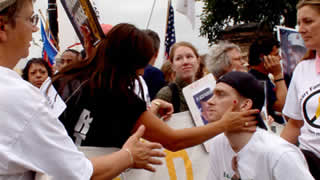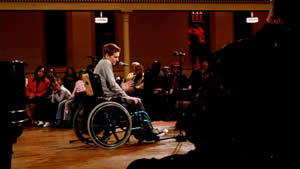Phil Donahue and the DONAHUE show have been honored with 20 Daytime Emmy Awards, including nine for Outstanding Host and a George Foster Peabody Broadcasting Journalism Award.
Phil Donahue used the television talk show format he pioneered in 1967 to interview world leaders, celebrities, newsmakers and people from all walks of life. For over 29 years, DONAHUE examined human behavior, focused national debates on political and social issues and has provided a democratic forum for presidential candidates.
As host of Donahue, Mr. Donahue has presided over nearly 7,000 one-hour daily shows, many on-location broadcasts and several historic broadcasts from Russia.
For almost two decades Guggenheim and Rockefeller fellow Ellen Spiro has created award-winning and imaginative documentaries, including Diana’s Hair Ego, Greetings From Out Here, Roam Sweet Home, Atomic Ed & the Black Hole, Are the Kids Alright? (with Karen Bernstein) TROOP 15OO (with Karen Bernstein) and, now, Body of War (with Phil Donahue).
Spiro is a two-time recipient of the Rockefeller fellowship, a Guggenheim fellowship, National Endowment for the Arts Fellowship, Bellagio Residency Fellowship and winner of an Emmy Award for Are the Kids Alright?. Spiro’s films have been shown in film festivals and broadcast on television worldwide on PBS, HBO, BBC, CBC (Canada) and NHK (Japan).
and winner of an Emmy Award for Are the Kids Alright?. Spiro’s films have been shown in film festivals and broadcast on television worldwide on PBS, HBO, BBC, CBC (Canada) and NHK (Japan).
Spiro’s works are housed in the permanent collections of the Museum of Modern Art in New York and in the Peabody Collection of the Museum of Television and Radio. Her films have pushed the boundaries of the documentary form, thriving both in the art world and in television and film festival venues.
Body of War is an intimate and transformational feature documentary about the true face of war today. Tomas Young, 25 years old, paralyzed from a bullet to his spine — wounded after serving in Iraq for less than a week. Body of War is his coming home story as he evolves into a new person, dealing with his disability and finding his own unique and passionate voice against the war.
 Bijan Tehrani: What motivated you to make Body of War? Did meeting with Tomas Young trigger it?
Bijan Tehrani: What motivated you to make Body of War? Did meeting with Tomas Young trigger it?
Phil Donahue: Yes, my meeting with Tomas Young in early 2005 moved me to share his story with other Americans. Body of War takes a close up look at the drama taking place in thousands of homes across America who proudly sent loved ones to war, and are now dealing with the especially hideous injuries sustained in Iraq.
Bijan: What was in Tomas’ character that impressed you most?
Phil: I really didn’t know who Tomas Young was until I flew to Kansas City; This was my first opportunity to chat with Tomas and discover his politics. The revelation was stark – I noticed he was saving bumper stickers, and one of them read, “draft republicans”. And when I saw that I knew that Tomas and I had similar political views.
Bijan: Did your long and successful years of hosting modern TV talk shows and interviewing world political figures helpe you in making of Body of War? 
Phil: Obviously, the Donahue Show experience follows me everywhere now, and is often useful for new projects. For example, more than three decades ago, I interviewed Bobby Muller, a Vietnam vet who sustained a wound very similar to the injury sustained by Tomas. This gave us a scene in our movie in which we see Muller giving Tomas an educated preview of the life that ahead of him – a life altered not only by his inability to walk, but by bowel and bladder problems. And no small issue for a 27 year old male in the prime of life, Thomas has erectile dysfunction – caused by his wound.
Bijan: When did you choose to bring in your co-director, Ellen Spiro, to the scene?  Phil: Ellen Spiro was referred to me by a mutual friend. I made a cold call to her, and she recognized me – thank god. We had a blind date in Kansas City, meeting at the airport, and going directly to Tomas’ residence. It was there that Ellen signed on to our project – she took a huge risk with me. We really didn’t know each other, and one of the biggest breaks in the creation of this movie is the lucky choice of a wonderful cinematographer and co-director, Ellen Spiro.
Phil: Ellen Spiro was referred to me by a mutual friend. I made a cold call to her, and she recognized me – thank god. We had a blind date in Kansas City, meeting at the airport, and going directly to Tomas’ residence. It was there that Ellen signed on to our project – she took a huge risk with me. We really didn’t know each other, and one of the biggest breaks in the creation of this movie is the lucky choice of a wonderful cinematographer and co-director, Ellen Spiro.
Bijan: Why did you use congressional Iraq invasion debates in Body of war?
Phil: Our movie also shows the debate on the floor of Congress during the 2002 Iraq War Resolution – the dialogue on the floor. In BOW, we see not only the horrendous challenge of one American family, we also see the superficial, bumper sticker, White House talking points and robotic debate that sent 4,000 American soldiers to their death – one of the most regrettable and consequential votes in the history of Congress.
See our movie, see how congress helped us get into this horrible dilemma, and see one family’s sacrifice – sacrifices being shared by less than 5% of our population.
We believe that media has a responsibility to show the nation the real pain of war. Don’t sanitize the war. Tell the truth about the sacrifice that you are asking thousands of military families to make. We have protected by the first amendment, a moral responsibility to resists sanitizing this war.
thousands of military families to make. We have protected by the first amendment, a moral responsibility to resists sanitizing this war.
Bijan: During making of Body of War, did you witness any changes or growth in Tomas’s character?
Ellen Spiro: When we started filming Tomas was addicted to morphine. The VA prescribed it for his pain and he had to take more and more of it to ease the pain. When Tomas started weaning himself from the morphine he became more articulate. He took his anti-war feelings, which were mostly expressed on bumper stickers on his van, and became active in the anti-war movement. When he joined IVAW (Iraq Veterans Against the War) he became aware that his story was important and that he could help end the war.
| Text box |
 Bijan: What was Tomas’ reaction to the finished film?
Bijan: What was Tomas’ reaction to the finished film?
Ellen: Tomas wants the film to be seen as widely as possible. He is comfortable with the scenes that show him in a vulnerable state because he understands that exposing his own vulnerability, and pain, is the greatest expression of strength.
Bijan: There are several documentaries dealing with Iraq invasion issues, what makes Body of war different from those other films?
Ellen: Our film brings the war home and makes it personal. It is extremely intimate and in-depth because it focuses on a single protagonist. When viewers watch BODY OF WAR they feel compelled to take action to end the war because they feel as if they KNOW Tomas Young and his family, that they have a personal connection to the war. Change starts with people’s hearts, then minds.
Bijan: What was the most challenging aspect of making Body of war? 
Ellen: Showing Tomas’ reality in a truthful way without stigmatizing Tomas. The scene in which Tomas is most vulnerable, when his mother is changing his catheter in the van, reverses the power dynamic between viewer and subject. Tomas and his mom are making fun at their situation, laughing at themselves in a way that makes the viewer uncomfortable and gives them the upper hand. Tomas and his mom are comfortable but the viewer is agitated.
Bijan: Are you planning to work on any other documentary with the same team that created Body of war?
Ellen: Phil has a heart of gold, an artist’s conscience and is willing to take more risks than Evil Kneivel. Our editor, Bernadine Colish, is an absolute genius. Eddie Vedder’s music is pure poetry and captured the essence of our story. I would be thrilled to work with any of them again. It was a small, very gifted team.
